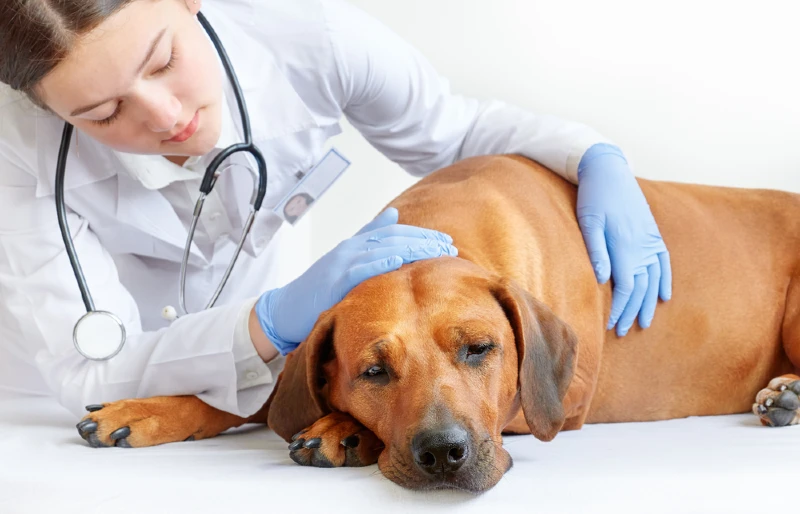Thiamine Deficiency in Dogs: Signs, Causes & Care (Vet Answer)
By Dr. Kim Podlecki, DVM (Vet)
Updated on

Click to Skip Ahead
Thiamine, otherwise known as B1 vitamin, is something that needs to be supplemented through your dog’s diet. With the development of many, well-balanced commercial diets, most dogs won’t suffer from a vitamin deficiency. However, if your dog has any underlying intestinal issues, and/or they are on a raw or homecooked diet, they may be at increased risk for developing a thiamine deficiency.
Continue reading to learn more about what a thiamine deficiency is, what causes it, what the clinical signs can be, and how to treat it.
What Is Thiamine?
Thiamine is another name for vitamin B1. Thiamine occurs naturally in many plants, grains, yeast, and legumes. B1 can also be found in animal organs such as the liver, heart, and kidneys. Thiamine is a water-soluble vitamin that can be actively absorbed from the intestinal tract in times of deficiency, or passively absorbed in times of excess. Once absorbed from the intestinal tract, thiamine is carried with the red blood cells where it is involved in several different processes in the body such as carbohydrate metabolism.
Animals require thiamine for their body to function properly. Interestingly, cats suffer from thiamine deficiency more commonly as they require almost three times as much of the vitamin as dogs do.

What Are the Signs of Thiamine Deficiency?
Unfortunately, the signs of thiamine deficiency are what we describe as “non-specific”. This means that the abnormalities are not specific to one body system and/or one clinical disease. For instance, your dog may suffer from diarrhea and/or a decreased appetite. Thiamine deficiency will likely not be high on the list of things your veterinarian may suspect as these signs can occur from almost anything.
More commonly your dog may develop neurologic abnormalities. These can include decreased vision and/or blindness, difficulty walking, weakness and incoordination (otherwise known as ataxia), different-sized pupils, downward flexion of the neck, and tremors and/or seizures. There are also a number of things that can cause these same abnormalities such as toxin ingestion, cancer, neurologic infections, or inflammation.
Once at the veterinarian, the doctor may notice an abnormal heart rhythm, an exceptionally fast heart rate (tachycardia) followed by periods of an exceptionally low heart rate (bradycardia). These are often not noticed externally but may be found during your veterinarian’s thorough physical exam or EKG testing.
What Are the Causes of Thiamine Deficiency?
If your dog has underlying intestinal disease such as parasites, IBD, cancer, or malabsorption disorder, they may be unable to absorb adequate amounts of the ingested thiamine. Over time this may lead to a deficiency. In addition, if your dog is on medications that cause them to drink and urinate frequently, this may also increase the elimination of thiamine through the kidneys and urine.
We can also commonly see thiamine deficiency in dogs who are not fed a well-balanced diet. If your dog is a “picky” eater and will only eat human food, they could be at risk of not ingesting enough B1. If your dog is on a homemade and/or raw diet, this may also increase their risk of thiamine deficiency. A well-balanced, commercial diet is the best way to ensure that your dog is getting the appropriate nutrients, including thiamine.

How Do I Care for a Dog with Thiamine Deficiency?
The only way to treat thiamine deficiency is to provide it to your dog. This is often done in combination with oral medications and potentially with injections by your veterinarian. In addition, if your dog is suffering from other diseases of the intestinal tract, kidneys, or is on other medications, your veterinarian will also need to try and control any abnormal symptoms from those diseases as well.
Because diagnosis is so difficult, your veterinarian may opt to treat your dog for thiamine deficiency if they strongly suspect it and monitor for response to treatment instead of any testing.
Frequently Asked Questions
How Is Thiamine Deficiency Diagnosed?
Unfortunately, it’s very difficult to diagnose thiamine deficiency. Often, affected dogs won’t present to the veterinarian until they are severely affected, and because the signs can occur from a number of diseases, thiamine deficiency is often not expected. Routine bloodwork will often be completely normal in addition to multiple modalities of imaging. There is no one test that can diagnose this condition. Your veterinarian will likely have to employ specialized testing or a referral to a specialist to determine whether your dog has a thiamine deficiency.

Can I Just Give My Dog My Own B Vitamins?
No. Always consult with your veterinarian before giving any human medications. Human medications may have other ingredients that can be toxic or fatal to your dog in even small amounts. Just giving your dog a vitamin, while the intent is good, may cause severe harm.
Conclusion
Thiamine, or B2 deficiency, while more common in cats, can occur in dogs. We see this most commonly in dogs with other underlying intestinal diseases or that are fed foods that are deficient in thiamine. This is most common in home-cooked and raw diets. Your dog may show non-specific signs such as anorexia, vomiting, and diarrhea. They may also develop a multitude of neurologic abnormalities. Unfortunately, there is no one test that will determine if your dog has thiamine deficiency, making recognition and diagnosis difficult.
Once diagnosed, or if your veterinarian strongly suspects your dog is suffering from this, your dog will need to be treated with thiamine supplementation for a few weeks. Your best bet for avoiding this condition is to feed a well-balanced, commercial veterinary food in addition to controlling any signs of other underlying intestinal diseases.
Featured Image Credit: SeventyFour, Shutterstock














